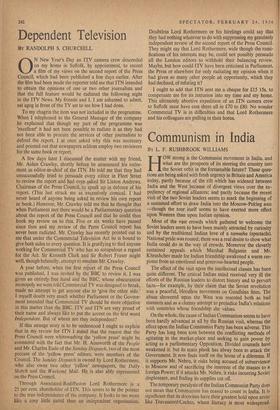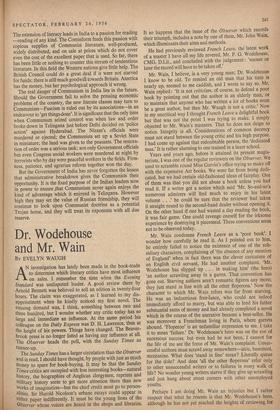Communism in India
BY L. F. RUSHBROOK WILLIAMS HOW strong is the Communist movement in India, and what are the prospects of its steering the country into the Soviet orbit in the foreseeable future? These ques- tions are being asked with fresh urgency in Britain and America today, partly because of the rift which has widened between India and the West because of divergent views over the ex- pediency of regional alliances; and partly because the recent visit of the two Soviet leaders seems to mark the beginning of a sustained effort to draw India into the Moscow-Peking axis —though the tour itself seems to have exerted more effect upon Western than upon Indian opinion.
Most of the vast crowds which gathered to welcome the Soviet leaders seem to have been mainly attracted by curiosity and by the traditional Indian love of a tamasha (spectacle). National pride was roused; there was a real desire to show what India could do in the way of crowds. Moreover the cleverly sustained appeals which Marshal Bulganin and Mr. Khrushchev made for Indian friendship awakened a warm res- ponse from an emotional and generous-hearted people.
The effect of the visit upon the intellectual classes has been quite different. The critical Indian mind received very ill the efforts of the Russian leaders to distort history and to pervert facts—for example, by their claim that the Soviet revolution was a peaceful, bloodless movement on Gandhian lines. The abuse showered upon the West was resented both as bad manners and as a clumsy attempt to prejudice India's relations with countries whose friendship she values.
On the whole, the cause of Indian Communism seems to have been hardly advanced at all by the Russian visit, whereas the effect upon the Indian Communist Party has been adverse. This Party has long been torn between the conflicting methods of agitating in the market-place and seeking to gain power by acting as a parliamentary Opposition. Divided counsels have weakened it: but its main plank has alway been to attack the Government. It now finds itself on the horns of a dilemma. If it supports Mr. Nehru, it risks being accused of subservience to Moscow and of sacrificing the interests of the masses to a foreign Power; if it attacks Mr. Nehru, it risks incurring Soviet displeasure, and finding its supplies cut off.
The temporary paralysis of the Indian Communist Party does not mean that Communism has ceased to count in India. It is significant that its doctrines have their greatest hold upon areas like Travancore-Cochin, where literacy is most widespread. The extension of literacy leads in India to a passion for reading —reading of any kind. The Cominform feeds this passion with copious supplies of Communist literature, well-produced.
widely distributed, and on sale at prices which do not cover even the cost of the excellent paper that is used. So far, there has been little or nothing to counter this stream of tendentious literature. In this field the Western nations give little help. The British Council could do a great deal if it were not starved for funds; there is still much goodwill towards Britain. America has the money, but her psychological approach is wrong.
The real danger of Communism in India lies in the future. Should the Government fail to solve the pressing economic problems of the country, the new literate classes may turn to Communism—Fascism is ruled out by its associations—in an endeavour to 'get things.done'. It is significant that the only time when Communism seized control was when law and order broke down in Telingana just before Delhi decided on 'police action' against Hyderabad. The Nizam's officials were murdered or ejected; the Communists set up a Soviet State in miniature; the land was given to the peasants. The restora- tion of order was a serious task; not only Government officials but even Congress social workers were murdered at night by terrorists who by day were peaceful workers in the fields. Firm- ness, patience, and agrarian reform together won the day.
But the Government of India has never forgotten the lesson that administrative breakdown gives the Communists their opportunity. It is the fixed purpose of the Indian leaders now in power to ensure .that Communism never again enjoys the kind of advantage which it enjoyed in Telingana. However high they may set the value of Russian friendship, they will continue to look upon Communist doctrine as a potential Trojan horse, and they will treat its exponents with all due reserve.



































 Previous page
Previous page